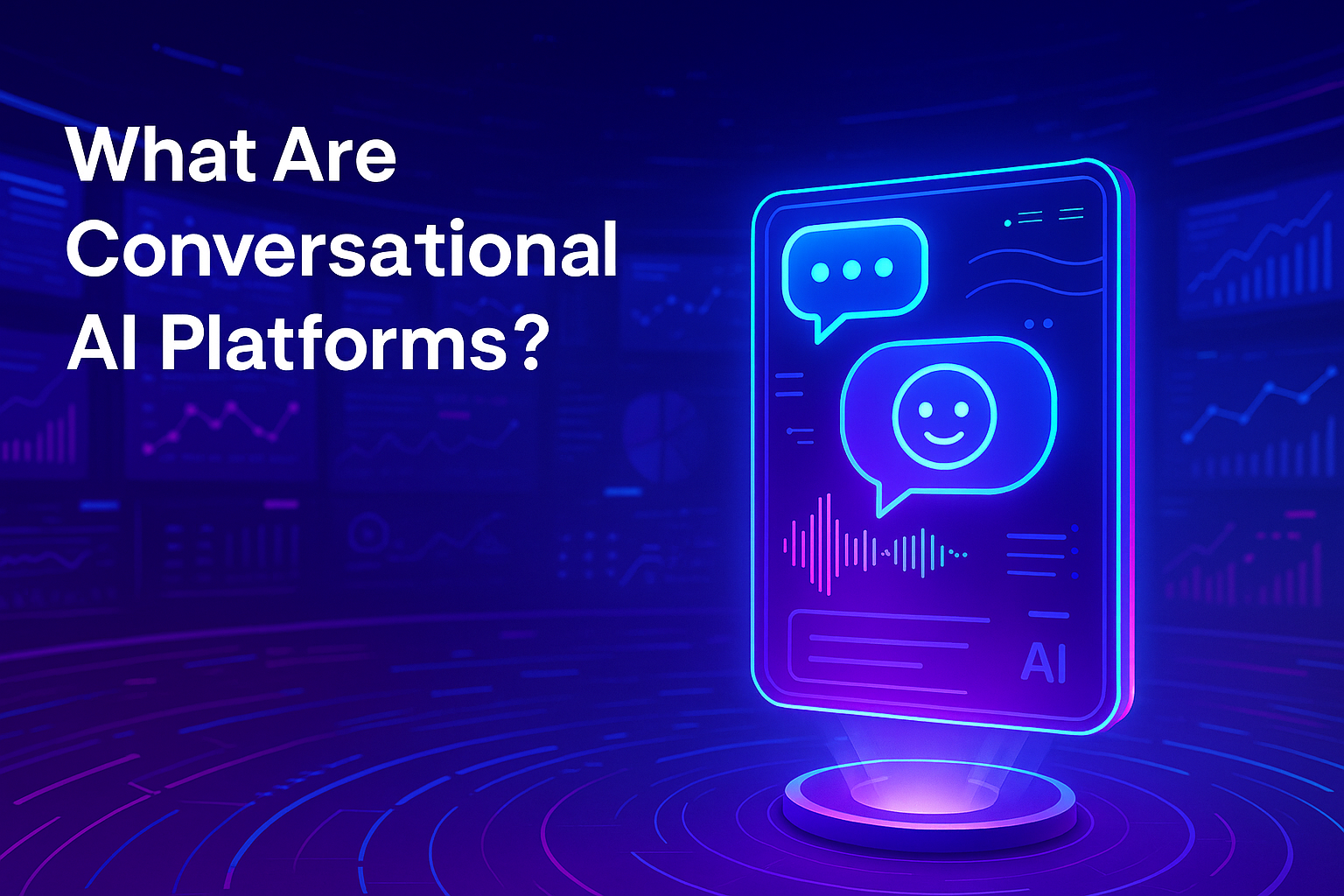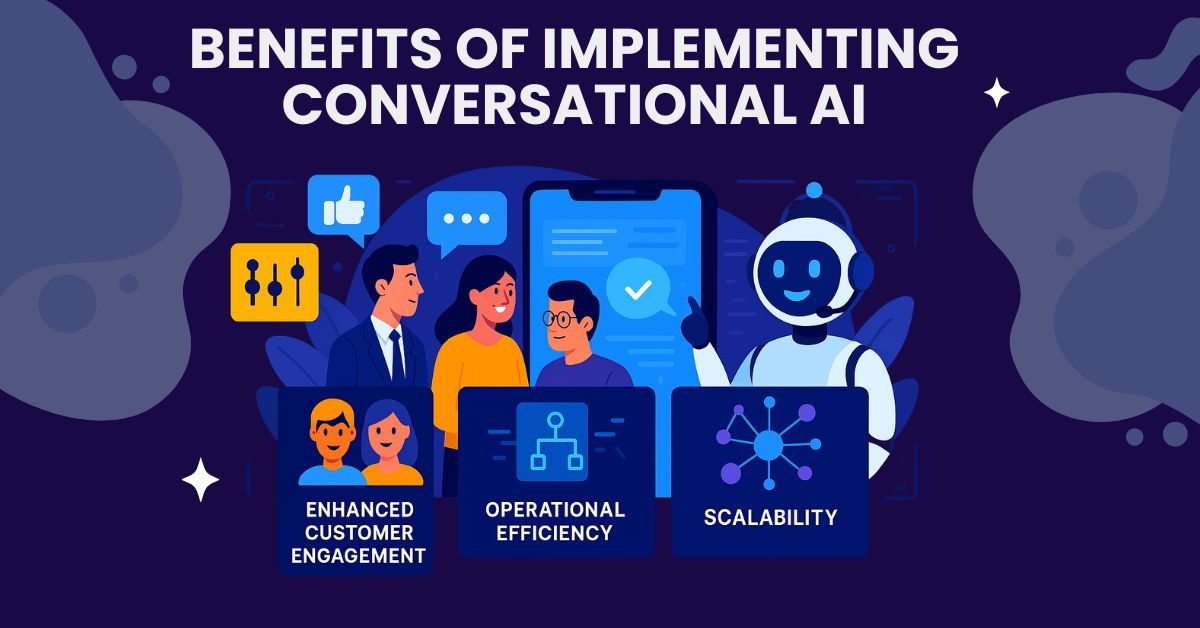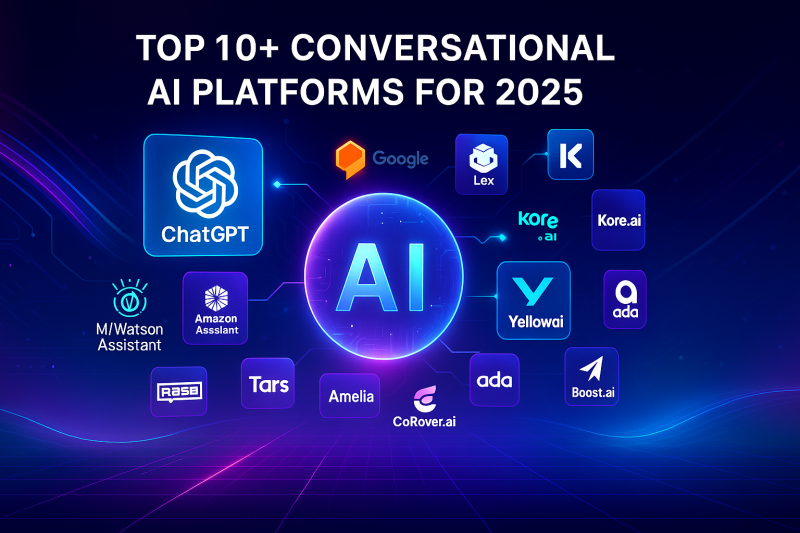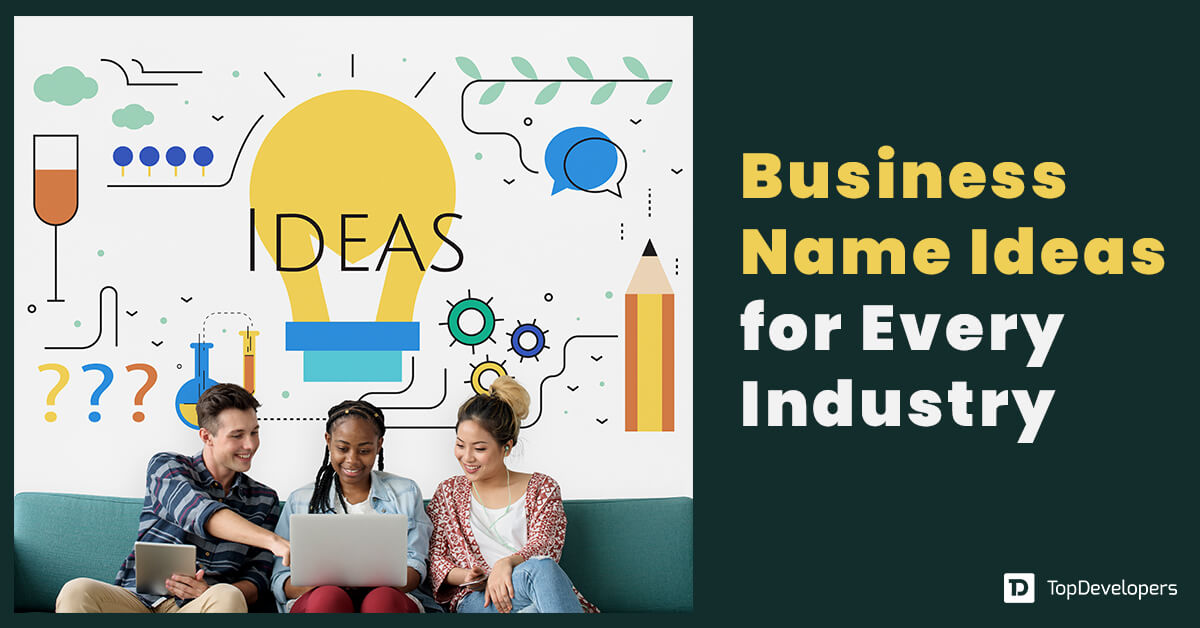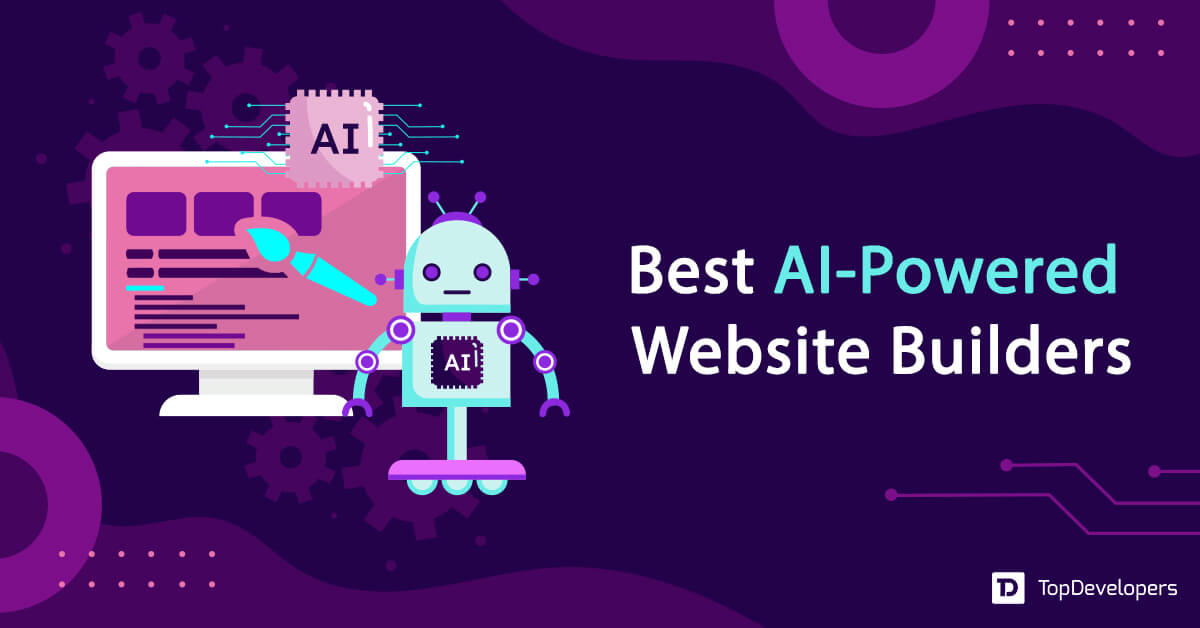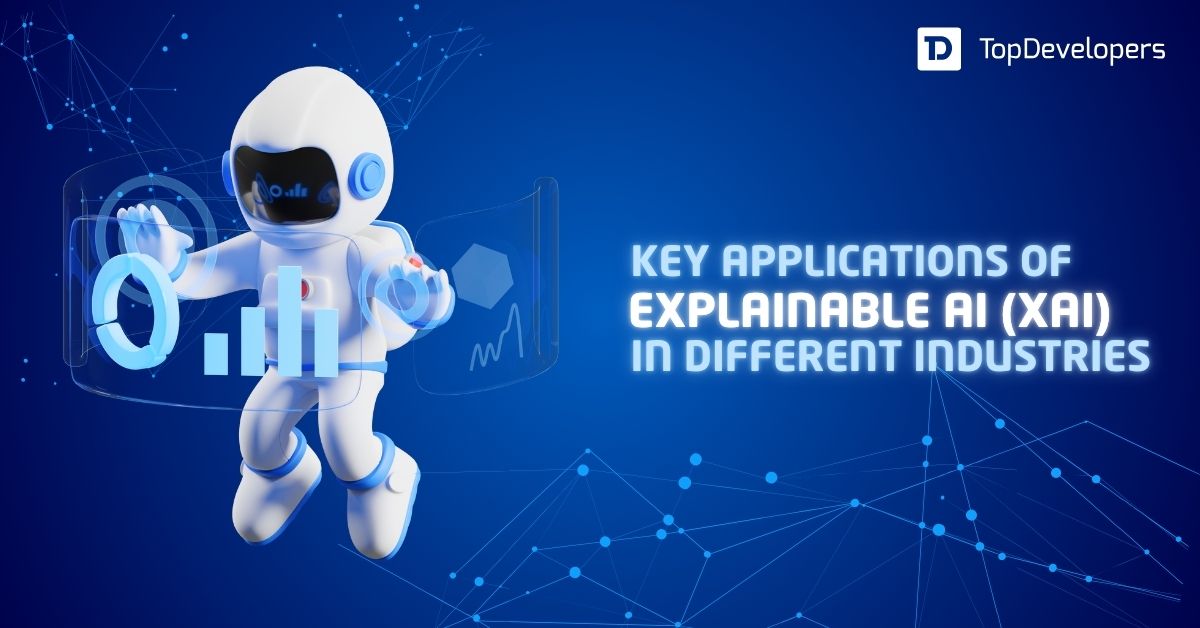
Conversational AI has gone from being a new idea to a game-changing tool for enterprises all around the globe. New technologies like ChatGPT have sped up this change by providing solutions that range from creating content to automating customer assistance. According to Statista, the worldwide chatbot business will be worth $1.25 billion by 2025. This shows how much more people are relying on conversational AI to make their experiences better.
Search Engine Journal did a survey that indicated that 40% of people like talking to chatbots when they connect with companies. These systems provide immediate, tailored help, which makes operations easier and increases client satisfaction. Conversational AI uses both Natural Language Processing (NLP) and Machine Learning (ML) to do things that regular chatbots can’t. It changes customer service, virtual help, and more.
This article looks at the best conversational AI platforms of 2025, talking about what makes them different, what they can do, and how they may be used. This article gives companies the information they need to make smart choices and use AI to their advantage. It compares conversational AI to conventional chatbots and lists the most important factors to consider when choosing the proper platform.
Table of Contents
What Are Conversational AI Platforms?
Conversational AI platforms are smart software systems that help businesses create and manage virtual agents like chatbots, voice bots, and digital assistants. These platforms make it easier to design conversations, train AI on real-world language, and deploy solutions across multiple channels.
The goal is simple deliver fast, accurate, and human-like support anytime and anywhere.
With these tools, businesses can build multilingual bots, test and refine how they respond, and use built-in analytics to improve performance. Many platforms also support automation in sales and service, helping companies scale their operations and boost revenue.
In short, these platforms make AI-powered communication more accessible and effective.
Benefits of Implementing Conversational AI
AI-powered chatbots use data analytics to make conversations more personal, which boosts conversions. It also scales up easily at busy times, so service is always the same. Multilingual support helps you reach more people across the world, while sentiment analysis helps you learn more about your customers. Conversational AI takes care of FAQs and transactions, freeing up human agents to deal with more complicated problems. This increases productivity and helps businesses thrive.
Enhanced Customer Engagement
Conversational AI enables businesses to create fast, personalized, and engaging interactions. Unlike basic chatbots, these systems can understand user intent, context, and preferences, making every conversation feel more natural and meaningful.
Customers are more likely to stay engaged when they feel understood. AI systems analyze past interactions to offer personalized responses, such as suggesting products based on previous purchases. This not only improves user satisfaction but also drives higher conversion rates.
One major benefit is 24/7 availability. Customers can get support anytime without waiting for office hours. Plus, whether the conversation happens on a website, mobile app, or social media, the experience remains consistent.
Multilingual support also allows businesses to reach a global audience, while sentiment analysis tools provide insight into how customers feel during interactions.
Key takeaway: With better engagement, businesses build stronger relationships, improve retention, and increase long-term loyalty.
Operational Efficiency
Conversational AI significantly improves how businesses manage day-to-day operations. It automates repetitive tasks like FAQs, order tracking, or account updates, freeing up human agents to handle more complex or high-value issues.
By reducing manual work, companies can lower labor costs and improve overall productivity. Response times are also much faster. AI tools instantly address common questions, reducing wait times and keeping customers happy.
These systems integrate easily with CRMs, support platforms, and internal databases. This means they can fetch data, log issues, or even initiate transactions without manual effort.
Example: A telecom company using conversational AI can resolve up to 80% of customer queries without human involvement.
Key takeaway: Streamlining support with AI improves service speed, reduces costs, and lets human teams focus on strategy and innovation.
Scalability
One of the standout benefits of conversational AI is its ability to scale effortlessly. Whether you’re handling hundreds or millions of conversations, AI systems can manage the load without compromising on quality.
During peak seasons or sudden spikes in demand, AI tools maintain consistent performance. They don’t slow down, take breaks, or get overwhelmed like human agents. This is especially useful for industries like e-commerce, where traffic can surge during events like holiday sales.
Conversational AI also adapts to the size of your business. Startups and global enterprises alike can use the same platform, scaling up features and capabilities as needed.
Example: An online store can use AI to manage Black Friday traffic, answering thousands of customer questions in real time.
Key takeaway: Scalability allows businesses to grow without increasing operational stress, ensuring reliable service, no matter the volume.
Read: Predictive Analytics in Mobile Apps: The Comprehensive Guide
Top 10+ Conversational AI Platforms for 2025
1. ChatGPT (OpenAI)
Key Features
ChatGPT by OpenAI is one of the most advanced conversational AI platforms available today. It uses Generative AI and Large Language Model to produce highly contextual, human-like conversations. It supports both text and voice interactions and is available through APIs, apps, and integrations across channels. GPT-4 Turbo, its most recent version, is designed for speed and efficiency.
- Natural and coherent dialogue generation
- Memory and personalization support
- Code interpretation and data analysis features
- Plugin and web browsing capabilities (depending on plan)
- Multilingual support for global audiences
Why It Stands Out
ChatGPT is known for its versatility and ease of deployment. Whether used in customer support, internal tools, or sales assistance, it delivers near-human accuracy in language understanding. Its ability to recall user preferences (via memory) and integrate with other apps makes it an ideal enterprise solution. Developers also benefit from a highly customizable API and rapid model updates.
Ideal Use Cases
- Enterprise-level virtual assistants
- Customer service chatbots with advanced reasoning
- Knowledge base agents for internal support
- Educational and productivity tools with AI features
2. Google Dialogflow
Key Features
Google Dialogflow is a robust, developer-friendly conversational AI platform built on Google Cloud. It enables businesses to create voice- and text-based virtual agents that integrate seamlessly with web, mobile, and contact center platforms. With Dialogflow CX (for complex flows) and ES (for simpler bots), it suits a wide range of use cases.
- Built-in Natural Language Understanding (NLU)
- Multilingual support with over 30 languages
- Visual flow builder for managing conversations
- Easy integration with Google Cloud tools and APIs
- Pre-built agents and intent libraries
Why It Stands Out
Dialogflow is ideal for teams looking to design custom conversational experiences without starting from scratch. Its cloud-native architecture ensures scalability, security, and seamless deployment. The platform also offers analytics to optimize bot performance over time. For businesses already using Google Cloud, the integration is virtually effortless.
Ideal Use Cases
- Omnichannel virtual assistants for customer service
- IVR systems and voice bots for call centers
- Internal desk automation
- Interactive FAQ bots for websites and apps
3. Amazon Lex
Key Features
Amazon Lex is a conversational AI platform developed by AWS that powers both voice- and text-based bots. It uses the same technology behind Alexa, giving businesses access to sophisticated natural language understanding and automatic speech recognition. Lex is designed for developers and integrates seamlessly with the AWS ecosystem.
- High-quality speech-to-text and text-to-speech capabilities
- Built-in integration with AWS Lambda, Amazon Connect, and other services
- Multi-turn conversations and slot filling for complex queries
- Real-time transcription and sentiment analysis
- Scalable infrastructure with enterprise-grade security
Why It Stands Out
Amazon Lex stands out for its deep integration with AWS. This allows businesses to build advanced, voice-enabled solutions while leveraging existing cloud services. Developers can easily trigger back-end logic with AWS Lambda, making it ideal for automating tasks or accessing databases in real time. The platform is especially useful for voice-based applications and contact center automation.
Ideal Use Cases
- Voice-enabled customer service bots
- AI-powered IVR systems for call centers
- Automated scheduling, billing, and account management
- Internal service desks and employee support bots
4. Microsoft Bot Framework
Key Features
The Microsoft Bot Framework is a comprehensive platform for building, deploying, and managing intelligent bots. It supports a wide range of development tools and is deeply integrated with Microsoft Azure services. Developers can use SDKs in multiple languages and create bots that connect with Microsoft Teams, Skype, Slack, and more.
- Rich SDK support (.NET, JavaScript, Python, etc.)
- Azure Bot Services for easy deployment and scaling
- Built-in AI capabilities through Azure Cognitive Services
- Multi-language support and localization features
- Advanced dialog management for contextual conversations
Why It Stands Out
Microsoft Bot Framework offers a highly customizable development environment, making it ideal for enterprises needing full control over their bots. The tight integration with Microsoft 365 and Azure enables seamless access to data, authentication, and enterprise-grade security. Its modular architecture allows teams to build anything from simple FAQ bots to complex, multi-turn dialog systems.
Ideal Use Cases
- Enterprise chatbots integrated with Microsoft Teams
- AI-driven desk assistants for IT and HR
- Virtual onboarding and training bots
- Customer support bots for finance, healthcare, and education
5. IBM Watson Assistant
Key Features
IBM Watson Assistant is an enterprise-grade conversational AI platform that helps organizations build powerful, intelligent virtual agents. Backed by IBM’s AI and machine learning technologies, it enables bots to understand complex language patterns, deliver context-aware responses, and continuously learn from interactions.
- Natural Language Understanding (NLU) with intent recognition
- Voice and text support across multiple platforms
- Easy integration with CRM, ERP, and other business systems
- Watson Discovery integration for deep knowledge search
- Pre-trained industry models (e.g., banking, healthcare, retail)
Why It Stands Out
Watson Assistant is built for enterprises that demand security, flexibility, and control. It offers deployment options in the cloud or on-premises, giving businesses more data privacy flexibility. Its ability to connect with existing systems and pull real-time information sets it apart as a high-performance solution for complex workflows.
Ideal Use Cases
- Virtual agents for regulated industries like finance and healthcare
- Intelligent assistants for enterprise portals and intranets
- AI-powered support for customer service teams
- Voice assistants in contact centers with natural dialogue flow
6. Kore.ai
Key Features
Kore.ai is a leading enterprise-grade conversational AI platform focused on automating business interactions through voice and text. It offers a no-code/low-code interface that enables both technical and non-technical users to design intelligent virtual assistants. The platform supports omnichannel deployments and advanced NLP capabilities.
- Drag-and-drop conversation builder
- Domain-trained bots for HR, IT, banking, and more
- Contextual AI with sentiment and intent analysis
- Multilingual and multimodal support (voice, text, IVR)
- Seamless integration with CRMs, ERPs, and collaboration tools
Why It Stands Out
Kore.ai combines ease of use with enterprise-level sophistication. Its Experience Optimization (XO) Platform makes it easy to design, train, and deploy bots without writing complex code. Businesses can also use Kore.ai to manage workflows, automate repetitive tasks, and improve self-service through intelligent virtual assistants that understand user behavior and adapt over time.
Ideal Use Cases
- AI-powered service desks for IT, HR, and finance
- Banking bots for onboarding, transactions, and account queries
- E-commerce bots for product search, support, and post-sales service
- Healthcare assistants for scheduling, patient support, and triaging
7. Yellow.ai
Key Features
Yellow.ai is an AI-powered automation platform designed to deliver dynamic, human-like conversations across voice and chat. It uses a combination of NLP, machine learning, and predictive intelligence to automate customer and employee experiences. With support for over 135 languages, it’s built for global engagement.
- Dynamic AI agents for customer and employee experiences
- Voice AI with emotional tone detection
- Low-code bot builder with customizable workflows
- Pre-built templates for industries like BFSI, retail, and logistics
- Integration with 100+ platforms (Salesforce, Zendesk, WhatsApp, etc.)
Why It Stands Out
Yellow.ai sets itself apart by focusing on dynamic AI agents/bots that learn and adapt in real time based on user behavior and tone. The platform excels in automating both customer-facing and internal processes, with bots that can switch between channels (like WhatsApp, email, and voice) mid-conversation. It also features advanced analytics to continuously optimize engagement.
Ideal Use Cases
- Customer support automation across chat and voice
- Employee self-service portals for HR, IT, and payroll
- Omnichannel engagement for e-commerce and retail
- Voice bots for appointment scheduling, surveys, and lead generation
8. Rasa
Key Features
Rasa is an open-source conversational AI platform tailored for developers and data science teams who want full control over their virtual assistants. It offers advanced natural language understanding (NLU) and dialogue management powered by machine learning. Rasa is highly customizable and ideal for businesses with strict privacy or infrastructure needs.
- Open-source framework with complete backend control
- On-premise deployment for data privacy and security
- Modular architecture with NLU, dialogue management, and actions
- Integration-ready with messaging channels and APIs
- Active community and enterprise support options
Why It Stands Out
Rasa is unique because it allows organizations to build completely custom conversational agents without vendor lock-in. Unlike plug-and-play solutions, Rasa empowers teams to fine-tune language models, customize workflows, and deploy bots in secure, isolated environments. It’s ideal for companies with in-house development teams and specific compliance requirements.
Ideal Use Cases
- Privacy-sensitive industries like healthcare, banking, and government
- Custom chatbot development for internal or external use
- Companies needing full control over AI behavior and data
- Technical teams building scalable, context-aware AI assistants
9. Ada
Key Features
Ada is a no-code AI platform designed for businesses that want to automate customer service with minimal technical effort. It empowers non-technical teams to build and launch AI-powered chatbots that can handle high volumes of support queries while delivering personalized, real-time responses across multiple channels.
- No-code bot builder for quick deployment
- Personalized responses based on user behavior and CRM data
- Multilingual support for global businesses
- Seamless integration with tools like Zendesk, Salesforce, and Shopify
- AI training based on real user interactions
Why It Stands Out
Ada’s biggest strength is its simplicity. It allows marketing, support, and operations teams to take ownership of automation—no developers required. The bots can dynamically adjust responses based on customer data, previous conversations, and intent. Ada also focuses on proactive support, sending messages before users even ask for help.
Ideal Use Cases
- E-commerce and retail customer support automation
- SaaS onboarding and troubleshooting assistance
- Proactive customer engagement and retention
- Fast-scaling startups and mid-size businesses looking for ease of use
10. Tars
Key Features
Tars is a user-friendly chatbot platform focused on helping businesses convert leads and simplify customer interactions through highly engaging, goal-oriented conversations. Known for its drag-and-drop interface, Tars makes it easy to create conversational landing pages and chatbots without needing any coding skills.
- No-code conversation builder
- Pre-built chatbot templates for multiple industries
- Integration with Google Sheets, CRMs, and analytics tools
- Conversational forms and lead capture bots
- Detailed reporting and conversion tracking
Why It Stands Out
Tars shines when it comes to lead generation and conversion-focused chatbots. Instead of offering generic live chat, it enables businesses to guide users through specific workflows, like booking a service, getting a quote, or requesting a demo. Its conversational landing pages are optimized to increase engagement and reduce bounce rates.
Ideal Use Cases
- Lead generation for real estate, finance, and healthcare
- Appointment booking and service inquiries
- Customer onboarding through conversational forms
- Marketing teams looking for quick deployment and measurable results
11. Amelia
Key Features
Amelia is an advanced conversational AI platform developed by IPsoft, designed to deliver human-like interactions at scale. It combines natural language processing, sentiment analysis, and machine learning to create digital agents that can understand context, hold multi-turn conversations, and adapt to user emotions in real time.
- Context-aware, human-like dialogue capabilities
- Emotional intelligence with tone and sentiment detection
- Integration with enterprise systems like ERP, CRM, and ITSM
- Supports both voice and chat interactions
- Real-time learning and continuous self-improvement
Why It Stands Out
Amelia goes beyond basic automation by mimicking human conversation in both tone and behavior. It can handle complex workflows, switch between tasks mid-interaction, and respond empathetically. Businesses use Amelia not just for support but also for front-office roles like sales, onboarding, and HR services. It’s built to deliver a consistent and emotionally intelligent experience across channels.
Ideal Use Cases
- AI agents for banking, insurance, and healthcare
- IT helpdesk and HR automation
- Voice-enabled customer service in call centers
- Personalized onboarding for employees or customers
12. CoRover.ai
Key Features
CoRover.ai is a conversational AI platform best known for its AI Virtual Assistants powered by BharatGPT, India’s first large language model (LLM). It specializes in delivering secure, multilingual, and real-time virtual assistants across industries like government, travel, healthcare, and banking.
- Powered by BharatGPT for region-specific language support
- Multilingual bots supporting 12+ Indian languages
- Video, voice, and text-based interactions
- GDPR- and HIPAA-compliant data security
- On-premise deployment options for sensitive environments
Why It Stands Out
CoRover.ai stands out for its strong focus on localization, security, and compliance, making it a preferred solution for regulated industries and public sector organizations. It’s one of the few platforms that supports video bots alongside text and voice. CoRover also allows for full control over deployment, giving enterprises peace of mind around data privacy.
Ideal Use Cases
- Government services and citizen support portals
- Healthcare assistants for patient guidance and appointment booking
- Travel and tourism bots for real-time info and ticketing
- Enterprises needing multilingual AI with strict data privacy
13. Boost.ai
Key Features/Unique Capabilities
Boost.ai is a conversational AI platform designed for large enterprises seeking scalable, high-performing virtual agents. Known for its strong presence in banking, insurance, and public services, Boost.ai offers a no-code interface and advanced natural language processing with high accuracy, even across complex user queries.
- No-code bot creation and management
- AI training without requiring data science expertise
- Intent handling with industry-leading accuracy
- Continuous learning via real-time conversation data
- Integrates with CRM, ERP, and service desk tools
Why It Stands Out
Boost.ai is built for enterprise-grade scalability and stability. It allows organizations to deploy virtual agents across departments without sacrificing performance or customer experience. Its ability to maintain high accuracy across thousands of intents makes it ideal for complex, high-volume environments. The platform also includes a powerful AI trainer that empowers teams to fine-tune bots without coding.
Ideal Use Cases
- Customer service for banking, insurance, and telecom
- Virtual agents for government and public sector websites
- IT and HR support automation across large enterprises
- Businesses needing fast deployment at scale with minimal tech overhead
Essential Guide for You: Conversational AI vs Generative AI
How to Choose the Right Conversational AI Platform
There are so many conversational AI platforms to choose from that it might be hard to choose the ideal one. Here are some important things to think about that can help you make your choice:
Business Needs Assessment
Begin by looking at your company’s particular requirements and objectives for using conversational AI.
- Identify Pain Points: Figure out what problems you want to solve, such as making customer service response times shorter or automating processes that are done over and over again.
- Define Use Cases: Figure out where conversational AI will have the biggest effect, such as in customer service, generating leads, or running the business itself.
- Example: For example, a store may put more emphasis on bots that suggest products and help people get their carts back, while a healthcare provider would put more emphasis on bots that help people make appointments and answer questions.
- Key Takeaway: Knowing what your company requires will help you choose a platform that meets those requirements.
Budget Considerations
Your budget is quite important when it comes to choosing the correct platform.
- Evaluate Cost Models: Some platforms let you pay as you go, while others need you to pay for a year or make an upfront commitment.
- Account for Scalability Costs: As your use develops, think about how costs may change. This covers the number of users, integrations, and sophisticated features.
- Factor in Hidden Expenses: Keep an eye out for hidden charges, such as those that come with customization, extra integrations, or technical support.
- Example: For instance, a startup may choose a cheap, no-code solution, whereas a large company would spend money on a powerful platform with a lot of customization choices.
- Key Takeaway: Pick a platform that matches your budget and lets you grow in the future.
Industry-Specific Solutions
Some platforms are better than others at meeting the needs of certain sectors.
- Explore Templates: Find platforms that include templates or pre-built processes for your sector.
- Example: For instance, healthcare bots that follow HIPAA rules or e-commerce bots that help with upselling and recovering lost carts.
- Customization Options: Make sure the platform can be changed to meet the specific needs of your industry.
- Check for Compliance: Some fields, including banking and healthcare, have very rigorous rules. Make sure the platform meets all of them.
- Key Takeaway: An industry-aligned platform cuts down on setup time and makes sure everything works as it should.
Scalability Requirements
Make sure the platform can expand with your company.
- User Volume: Check to see how effectively the platform can handle more queries during busy times.
- Example: For example, an online store wants a chatbot that can handle the Black Friday rush without any problems.
- Flexibility in Features: Platforms that let you add new features, including voice assistance or the ability to work in more than one language, are best for long-term usage.
- Global Reach: If your firm works in more than one country, be sure the platform can handle different languages and regional differences.
- Key Takeaway: A scalable platform makes sure that your conversational AI solution will still work as your company changes.
Conclusion
Conversational AI is transforming how businesses communicate both with their customers and internally. With advancements in generative AI and natural language understanding, virtual assistants are no longer just simple bots. They’re smart, context-aware tools that deliver real value across industries.
As we approach 2025, these technologies are becoming more accessible, scalable, and powerful. From automating routine tasks to enhancing customer engagement, conversational AI is helping companies work smarter and serve better.
No matter the size of your business, now is the time to explore how these platforms can drive real impact. The right solution can streamline operations, reduce costs, and unlock new levels of productivity and personalization.
If you want to use conversational AI in your organization, a good place to start is by looking at the top conversational AI companies. These businesses focus on providing cutting-edge solutions that are adapted to the demands of different industries. They help corporations simplify their operations, improve consumer interaction, and encourage creativity.
Businesses can remain ahead of the curve and confidently embrace the digital future by using conversational AI technologies. By combining generative AI with conversational platforms, businesses will be able to change, come up with new ideas, and stay ahead of the competition in a market that is always changing.
FAQs
1. What are the best conversational AI platforms to use in 2025?
Top conversational AI platforms in 2025 include ChatGPT (OpenAI), Google Dialogflow, Microsoft Azure Bot Service, Amazon Lex, Rasa, Kore.ai, Yellow.ai, IBM Watson Assistant, Tidio, Drift, and Many Chat — each offering unique strengths for chatbot and voice assistant development.
2. How do conversational AI platforms work?
Conversational AI platforms use natural language processing (NLP) and machine learning to understand user inputs, generate context-aware responses, and continuously learn from interactions to improve communication quality.
3. What industries benefit most from conversational AI platforms?
Conversational AI is widely adopted in eCommerce, healthcare, banking, SaaS, hospitality, and customer support, helping businesses automate conversations, qualify leads, and provide 24/7 assistance.
4. What features should I look for in a conversational AI platform?
Essential features include multilingual support, omnichannel integration, analytics dashboard, custom workflows, API access, voice support, and low-code or no-code bot builders for easy deployment.
5. Can conversational AI platforms integrate with CRM and other business tools?
Yes, most leading conversational AI platforms offer seamless integration with CRM systems (like Salesforce, HubSpot), eCommerce platforms, marketing automation tools, and customer support software to streamline operations.
 Avantika Shergil
| Jun 27, 2025
Avantika Shergil
| Jun 27, 2025
Avantika Shergil is a technology enthusiast and thought leader with deep expertise in software development and web technologies. With over 8 years of experience analyzing and evaluating cutting-edge digital solutions, Avantika has a knack for demystifying complex tech trends. Her insights into modern programming frameworks, system architecture, and web innovation have empowered businesses to make informed decisions in the ever-evolving tech landscape. Avantika is passionate about bridging the gap between technology and business strategy, helping businesses build customized software and website, and understand about different tools to leverage effectively for their ventures. Explore her work for a unique perspective on the future of digital innovation.
